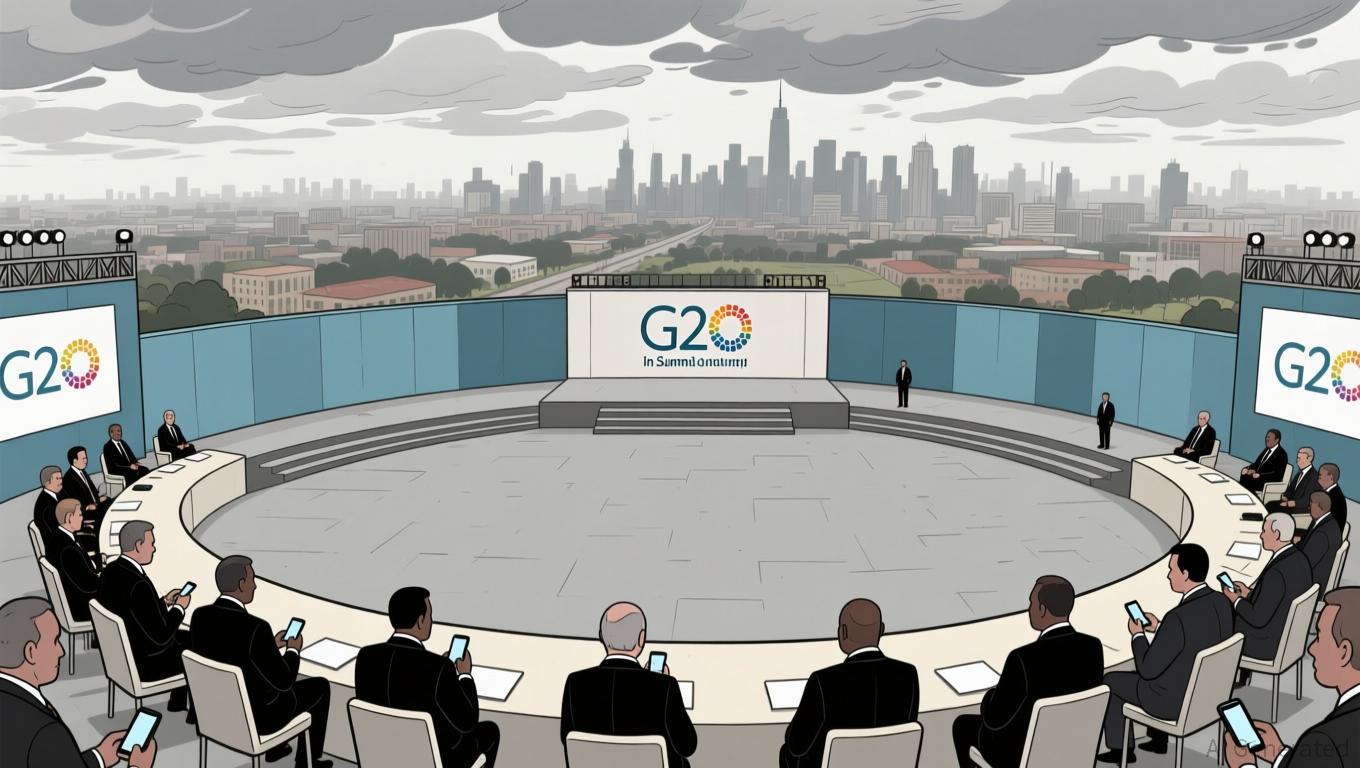G20's Challenges Highlight the Erosion of International Solidarity
- French President Macron warns G20 may face "end of a cycle" due to geopolitical fractures and U.S. multilateralism retreat. - G20 summit in Africa appears weakened by Trump's absence, China's nonattendance, and sparse leadership participation. - Trump's 28-point Ukraine peace plan sparks controversy, criticized as favoring Russia while demanding territorial concessions. - Macron highlights global governance dysfunction, stressing inability to uphold sovereignty and humanitarian law in conflicts. - Summit
French President Emmanuel Macron, recognized for his candid critiques of international organizations, has once again raised concerns—this time suggesting that the Group of 20 (G20) could be approaching the "close of an era" as geopolitical divisions deepen and the U.S. moves away from multilateral engagement. Speaking at the G20 summit in Johannesburg on November 22, Macron highlighted the fragile state of global cooperation, with the group struggling to reconcile diverging interests and
This G20 summit, the first ever held on African soil, was already undermined by Trump's decision not to attend—a move the U.S. administration justified by citing conflicting priorities with South Africa. The absence of the U.S., along with China and other key figures such as Italy's Giorgia Meloni, led Macron to describe the gathering as "lukewarm." He pointed to the "uninspiring visuals" of the group photo, where the sparse turnout and lack of iconic scenery reflected

Macron, who previously labeled NATO as "brain dead," portrayed the G20's difficulties as part of a wider global malaise. "We are finding it hard to establish a unified approach to geopolitical crises," he remarked, referencing the failure to uphold humanitarian principles and sovereignty in conflicts such as Ukraine. His concerns mirror growing worries about the weakening of multilateralism, especially as both the U.S. and China turn inward. South African President Cyril Ramaphosa, who hosted the summit, attempted to dispel the gloom, asserting that
The summit's final statement, which urged a "just" resolution for Ukraine and other disputes, was approved despite resistance from Argentina's Foreign Minister Pablo Quirno regarding the treatment of the Israel-Palestine conflict. European diplomats admitted that Trump's plan needs further refinement but emphasized that any deal must have the backing of both NATO and the EU. At the same time,
As the G20 confronts an unpredictable path forward, Macron's comments capture a widespread unease about the decline of collective action in an increasingly divided world. His dual critiques—of NATO and the G20—underscore his reputation as a challenger of institutional inertia, even as his own presidency approaches its 2027 conclusion. Ultimately,
Disclaimer: The content of this article solely reflects the author's opinion and does not represent the platform in any capacity. This article is not intended to serve as a reference for making investment decisions.
You may also like
Bitcoin Updates: Institutional Investors Return and Soft Policy Hints Drive Bitcoin's Significant Recovery
- Bitcoin surged above $89,000 in late November 2025, reversing a six-month low amid institutional reentry and macroeconomic optimism. - Fed rate-cut expectations (84% for December) and $238M Bitcoin ETF inflows fueled dollar weakness and crypto demand. - Coinbase's 22-day negative premium reversed, signaling easing institutional selling pressure and potential trend reversal. - Solana's $145 slump highlighted crypto divergence, while Bitcoin's $100,000 support and open interest dynamics indicated bearish e

Artificial Intelligence Applications in Biomedical Studies and Their Impact on Investment
- AI is revolutionizing drug discovery by accelerating timelines and reducing costs in pharmaceutical R&D. - Companies like Insilico Medicine and Exscientia use AI to cut drug development cycles by 70% and reduce compound testing, advancing candidates to clinical trials rapidly. - The AI-driven biotech market is projected to reach $350–410 billion annually by 2025, offering investment opportunities in AI-native firms and infrastructure providers. - However, regulatory challenges and the lack of approved AI

Internet Computer’s Latest Rally: Driven by Network Enhancements and Growing Institutional Interest
- Internet Computer (ICP) surged in 2025 due to technical upgrades, institutional partnerships, and speculative trading. - Fission/Stellarator boosted capacity by 50%, while Meridian/Flux aim to enhance cross-chain interoperability and scalability. - Q3 2025 saw $1.14B trading volume but 22.4% DApp engagement drop, highlighting infrastructure-user adoption disconnect. - TVL discrepancies ($237B vs. $1.14B) and reliance on institutional capital raise sustainability concerns amid inflated metrics. - Partners

South Korean Firm Bitplanet Boosts Bitcoin Stack to 228.5 BTC